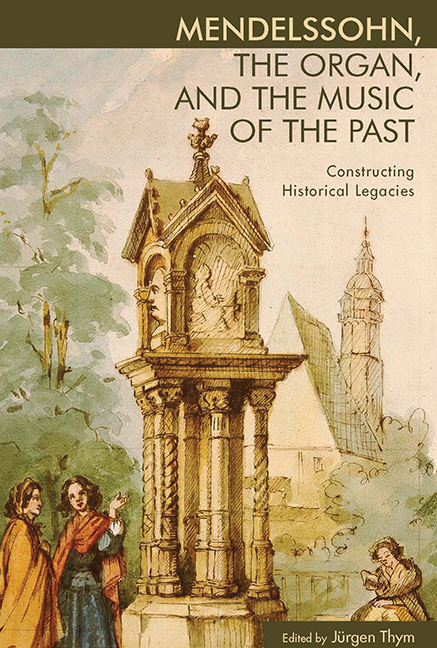Book contents
- Frontmatter
- Dedication
- Contents
- Acknowledgments
- Introduction: Of Statues and Monuments
- Part One Composition and Tradition
- Part Two Mendelssohn and the Organ
- Part Three Mendelssohn's Inherited Legacies in Context
- 8 The Bach Tradition among the Mendelssohn Ancestry
- 9 Music History as Sermon: Style, Form, and Narrative in Mendelssohn's “Dürer” Cantata (1828)
- 10 Mendelssohn's “Authentic” Handel in Context: German Approaches to Translation and Art and Architectural Restoration in the Early Nineteenth Century
- 11 Beyond the Ethical and Aesthetic: Reconciling Religious Art with Secular Art-Religion in Mendelssohn's “Lobgesang”
- 12 Mendelssohn's Religious Worlds: Currents and Crosscurrents of Protestantism in Nineteenth-Century Germany and Great Britain
- List of Contributors
- Index
8 - The Bach Tradition among the Mendelssohn Ancestry
from Part Three - Mendelssohn's Inherited Legacies in Context
Published online by Cambridge University Press: 14 March 2018
- Frontmatter
- Dedication
- Contents
- Acknowledgments
- Introduction: Of Statues and Monuments
- Part One Composition and Tradition
- Part Two Mendelssohn and the Organ
- Part Three Mendelssohn's Inherited Legacies in Context
- 8 The Bach Tradition among the Mendelssohn Ancestry
- 9 Music History as Sermon: Style, Form, and Narrative in Mendelssohn's “Dürer” Cantata (1828)
- 10 Mendelssohn's “Authentic” Handel in Context: German Approaches to Translation and Art and Architectural Restoration in the Early Nineteenth Century
- 11 Beyond the Ethical and Aesthetic: Reconciling Religious Art with Secular Art-Religion in Mendelssohn's “Lobgesang”
- 12 Mendelssohn's Religious Worlds: Currents and Crosscurrents of Protestantism in Nineteenth-Century Germany and Great Britain
- List of Contributors
- Index
Summary
The rediscovery of Johann Sebastian Bach and his music long after the composer's death in the Romantic period belongs among the most widespread misconceptions and misconstructions in the historiography of music. A statement like the following is symptomatic in this regard: “Bach and his works have met a strange fate at the hands of posterity. They were fairly well recognized in their day; practically forgotten by the generations following his; rediscovered and revived; and finally accorded an eminence far beyond the recognition they had originally achieved.”
Scholarship of recent decades has found it necessary to turn away from a Bach image that resembles the metaphorical paradigm of “Death and Resurrection,” the characteristic heading of the pertinent chapter in Albert Schweitzer's J. S. Bach: le musicien-poète of 1905 and its expanded German edition of 1908—arguably the most influential Bach book of all times. Informed by scholarship that was greatly inspired by the influential first edition of The Bach Reader and significantly substantiated by the groundbreaking source studies conducted in conjunction with the Neue Bach-Ausgabe (1954–2007), today's view differentiates between two complementary aspects of the Bach reception in the eighteenth and early nineteenth centuries. There is first the uninterrupted and rather broad, deep, and educationally focused Bach tradition as it spread throughout the decades after 1750 in professional musical circles where Bach's compositions were regarded as a continuing challenge, a source of inspiration, and a yardstick for measuring quality. Then there followed, largely after 1800 and as the result of a continuously growing interest in the music of the past among musical amateurs, a more widely based public reception of Bach's music in the early nineteenth century, for which the 1829 Berlin performance of the St. Matthew Passion conducted by the young Felix Mendelssohn Bartholdy represented the most decisive landmark. This essay focuses on a third and much less explored aspect as it surfaced in a small circle of early bourgeois Bach devotees in late eighteenth-century Berlin and in an atmosphere of emerging musical historicism.
The phenomenon of musical historicism had various origins, manifested itself in different ways, and eventually led to an ostensibly irreversible paradigm shift.
- Type
- Chapter
- Information
- Mendelssohn, the Organ, and the Music of the PastConstructing Historical Legacies, pp. 213 - 223Publisher: Boydell & BrewerPrint publication year: 2014



